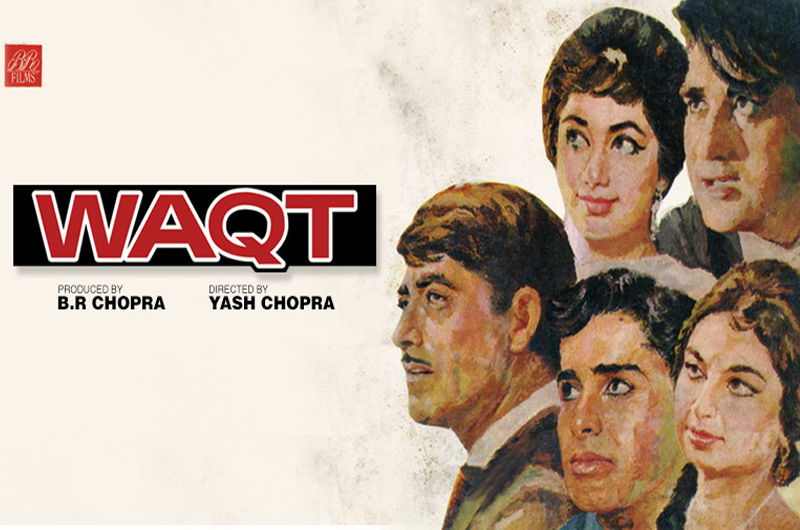It was the film that gave rise to the phrase ‘all star cast’. In the 1970s and 80s, multi-starrers were pretty common, but in the 1960s the grand daddy of this genre was Waqt, says Partab Ramchand. It set the trend for what was to come in the decades to follow and its critical acclaim and commercial success made it a viable proposition for Bollywood film-makers to think, plan and go big, he says, as he explains how Waqt, the first colour film under the BR Films banner, turned out to be a blockbuster at the box office
In the 1950s and early 60s, B.R. Chopra under the BR Films banner made a number of socially relevant films with a soft-pedaled message. He was also able to feel the pulse of the audience, for almost all his movies fared well at the box office. Starting off with Afsana in 1951, with Ashok Kumar playing twin brothers, starting a trend for such dual roles, Chopra did not look back and made in quick succession meaningful films such as Ek Hi Rasta, Naya Daur, Sadhana, Dhool Ka Phool, Kanoon, Dharmaputra and Gumrah. By this time, he had handed over the director’s baton to his younger brother, Yash Chopra, who made his debut with Dhool Ka Phool and then Dharmaputra and Gumrah. Yash displayed the same bold approach of his elder brother who continued as producer in making socially responsible films with a message.
Following the success of Gumrah (1963), the brothers decided to change gears by going in for a really ambitious project. The film would have the biggest star cast assembled, would be almost three hours long and the technical credits would be first rate. It would also be the first colour film under the BR Films banner. Two years in the making, Waqt was finally released in July 1965. By now, word had spread around that it was a special film in many ways and audiences eagerly looked forward to it.
They were not disappointed as it contained all the qualities associated with a BR Films presentation. It was a big budget film but the Chopras were experienced enough to handle the big budget tastefully. It had a powerful story, marked by memorable dialogues that have stood the test of time. The sets were lavish, the costumes gorgeous, the locales picturesque and the technical credits set new standards. The melodious music by Ravi and the meaningful lyrics by Sahir were embellishments. Even today, the songs are hummed by the older generation while the younger folk prefer the original tunes rather than the tasteless remixes.
Waqt was also one of the early lost-and-found storyline movies to strike a chord with the public, a genre that has been done to death since. But the situations were believable and how Time (Waqt) in the form of an earthquake separates a family of parents and three sons and brings them together again years later was logically depicted on screen. The climax in the form of a long and tense courtroom scene added to the dramatic quality of the film which never once drags despite its length.
However, with all its many admirable aspects, Waqt has been recalled fondly over the past six decades mainly because of its star cast. It is safe to say that never before had a Hindi film appeared to go close to the MGM credo that proclaimed ‘More stars than there are in Heaven’. Sunil Dutt was a popular leading man of the 1960s and a BR favourite. Raaj Kumar was always going to be an asset with his commanding screen presence and inimitable dialogue delivery. Sadhana was then arguably the No. 1 female star in the industry, appearing in Waqt following the huge success of Mere Mehboob and Who Kaun Thi. Shashi Kapoor was already an established actor while Sharmila Tagore had become an overnight sensation with Kashmir Ki Kali.
The supporting cast was equally strong. Balraj Sahni as the patriarch had a pivotal role and others with important parts included Rehman, Leela Chitnis, Achla Sachdev, Surendra, Madan Puri, Motilal and Manmohan Krishna, another BR regular. And even in bit parts, Jeevan, Sashikala, Sumati Gupte, Raj Mehra, Mubarak, Hari Shivdasani and Jagdish Raj leave an impression.
But behind the opulent sets, the big budget and the aura surrounding the star cast, the Chopras did not forget the inevitable message that was an essential component of their films. Balraj Sahni provides this just before the film ends. When Raaj Kumar, playing his eldest son, smugly tells his father that he and his brothers will see that the family business goes places and becomes bigger, Balraj cautions him saying, “Beware of Time (Waqt), son. It caused us to separate and then years later brought us back again. Time is everything and one has to respect it. Time destroys everything and restores everything.”
Waqt turned out to be a blockbuster at the box office. It was also widely acclaimed by the critics who saw it as a trendsetter besides being a superior BR Films product. It picked up five Filmfare Awards, including Best Supporting Actor for Raaj Kumar and Best Director for Yash Chopra. The others were for Best Colour Cinematography (Dharam Chopra), Best Dialogue (Akthar ul Iman) and Best Story (Akthar Mirza).
(The writer is a veteran sports writer who spent his career working for The Indian Express and The Telegraph and Sportsworld. He has more than a passing interest in old films and music. He lives in Chennai.)



 from Webdoux
from Webdoux